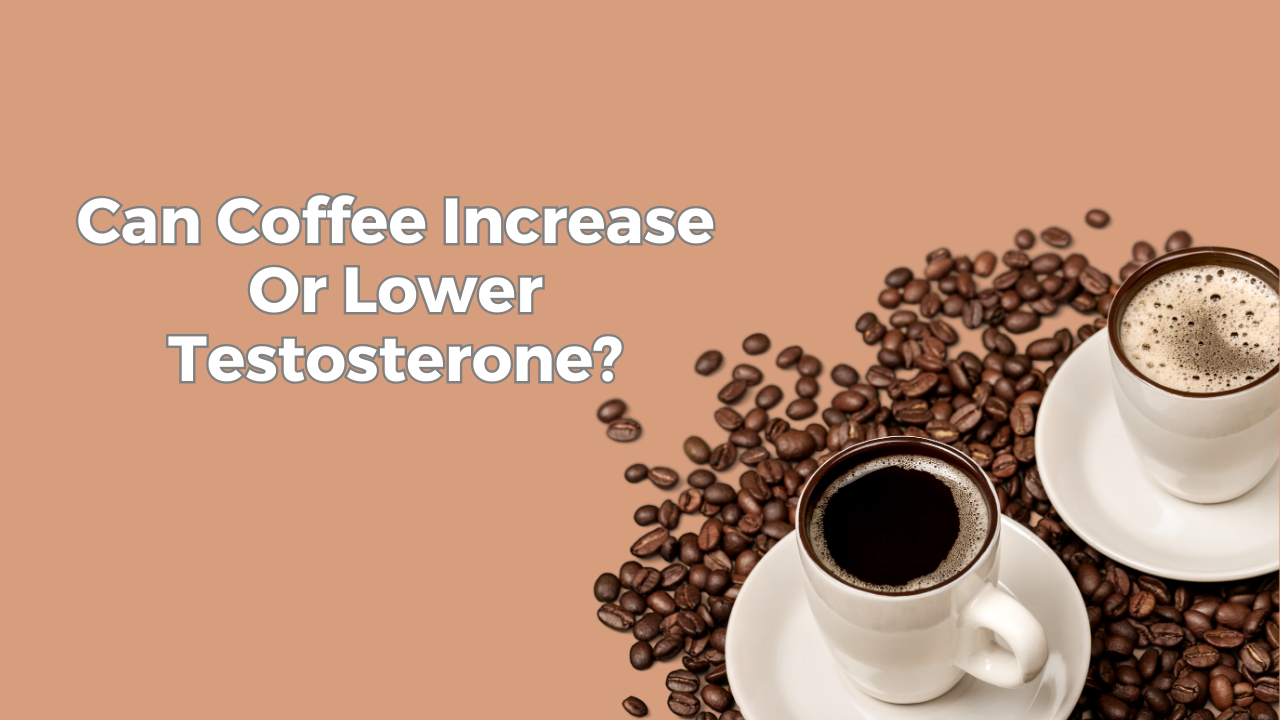Does Coffee Increase Or Lower Testosterone?

The effect of coffee on testosterone- whether it reduces its synthesis or supports the process, is one of the areas that many people are keen to understand- especially those looking to raise their testosterone levels.
The reason is – coffee is known for its excellent restorative properties when taken in moderation, which makes it one of the go-to beverages for most people. However, one important thing to note here is that its effect on the body can vary depending on its unique biochemical mix.
We have covered here various aspects related to coffee and testosterone like how it impacts testosterone levels and other body functioning, the main ingredients found in it, how much coffee you can safely consume, studies associated with coffee and testosterone, and more.
Key Ingredient Of Coffee: Caffeine
The main ingredient of coffee is caffeine- the compound behind the stimulating effect of this beverage. This is why coffee is termed a ‘caffeinated drink’, with its most prominent effect being increasing steadiness and boosting energy. As for its effect on testosterone, caffeine has been proven to improve the metabolic function of the body, which helps in weight management which is an important factor in testosterone regulation.
When you consume coffee, the caffeine hits your brain and nervous system directly, thus triggering the release of neurotransmitters like dopamine and serotonin, among others. These then help speed up the message transmission between the brain and the body, delivering the state of wakefulness.
Aside from being an active component in coffee, caffeine is also present in other beverages like green tea, regular tea, energy drinks, and various dietary supplements.
Now, it is worth mentioning here that caffeine, being a stimulant, may not be suitable for everyone. If you are allergic to stimulants, then coffee may be far from being an option for you. Some of the most common side effects of coffee consumption include sleeplessness, agitation, stomach upset, and high blood pressure levels.
Other Sources Of Caffeine

When we speak of caffeine, the most common food that first strikes our mind is coffee. However, there are numerous other foods and beverages which have caffeine as one of their ingredients. While it’s hard to mention all, some of the most common ones which have significant amounts of caffeine as an active ingredient include expresso, tea (both green and black), energy drinks, chocolate (cacao), soda, and a few other aerated drinks.
You may also be surprised to know that it’s not just coffee plants that have caffeine. There are some other plants like the Guarana which have caffeine as an active component in it. This is why many energy drinks and dietary supplements use guarana plant extracts as one of their potent ingredients.
Speaking of supplements, several testosterone boosters as well as weight loss supplements include caffeine in their list of ingredients so the users can reap its benefits.
Having said that, for people with caffeine sensitivity, there are plenty of non-caffeinated beverages and supplements available in the market. Be sure to check the ingredients first before you make a purchase.
Are Coffee And Testosterone Correlated
The relationship between testosterone and caffeine is close. While many people drink coffee only as a refreshment beverage, coffee does have a favorable impact on the production of testosterone in men.
Those who drink coffee regularly were found to have higher levels of testosterone than men who do not. However, the effect is short-term. This means while it can temporarily spike testosterone levels right after taking the beverage, it cannot be considered a long-term fix for testosterone deficiency.
There can be numerous underlying reasons behind low testosterone and it is best to seek professional advice for treating the issue.
Many T-boosting supplements also use coffee or caffeine as one of their active components along with various other ingredients which work together to improve different body processes that are directly or indirectly linked with testosterone synthesis. However, the manufacturers also suggest that supplementation will only give optimum results when paired with an active lifestyle and a healthy diet regime.
Scientific Research On Caffeine And Testosterone

So far you have been reading about the fact that caffeine supports testosterone synthesis in men. However, you can only be more sure when you see the science-based evidence behind it. While some studies show a positive influence of coffee on serum testosterone, a few findings were either negative or remained inconclusive.
Here are some of the studies conducted by various groups which support the impact of coffee or caffeine on testosterone:
One of the studies from ‘The International Journal of Sports Nutrition and Exercise Metabolism’ was to find out the influence of caffeine on testosterone. It involved examining the effect of varied doses of caffeine on a group of athletes just before their routine strength training. The researchers concluded that caffeine has the potential to elevate testosterone levels. However, it also increased the cortisol levels which needs to be taken into consideration because high levels of this hormone are a hindrance to testosterone production.
A study conducted to see the correlation between testosterone and caffeine also supported the fact that caffeine can have a positive impact on testosterone.
Aside from that, one of the research groups found an indirect association of coffee with testosterone. In a clinical trial for examining the effect of coffee on metabolic function, it was observed that there was a significant rise in the metabolic rate after coffee consumption. While this may not have a direct association with testosterone, boosting the metabolic function accelerates the fat-burning process. It is a known fact that obesity reduces testosterone production and losing weight helps regulate the hormone.
A 2022 research finding stated that coffee can significantly lower the production of sex hormone-binding globulin and estrogen concentration thus maintaining the testosterone levels in the blood.
Amidst all the supporting reports, there are a few findings that either contradicted the above cases or are indecisive.
For example, a cross-sectional study conducted by David S. Lopez and the team found that there was no relation between testosterone and caffeine consumption as no change was observed during the experiment. Another study from Nutrition Journal 2012 also agreed to this point stating that there was no significant association between drinking coffee and testosterone production.
Effect Of Caffeine On Other Hormones

Caffeine is quite a dynamic substance that not only impacts testosterone but also triggers many other hormones.
Cortisol: Also called the ‘stress hormone’, cortisol contributes to various body functions like responding to stress and elevating glucose levels in the blood for the brain to use. It also spikes energy levels and increases the bioavailability of components that support tissue repair and reduces inflammation.
Studies have shown that caffeine in coffee or other sources interacts with cortisol and increases its levels which in many cases can be useful. However, as in the case of any other hormone, there has to be a balance in the level; both over- and under-secretion can have adverse effects on the body’s processes.
Adrenalin: Yet another ‘fight or flight’ neurotransmitter, adrenalin helps you to act during stressful circumstances by releasing sudden but short boosts of energy. Coffee consumption supports this process by boosting blood pressure and increasing energy which prepares your body to work under stressful conditions.
Serotonin and Dopamine: Both these hormones are responsible for elevating mood and providing a ‘feel-good’ factor allowing the mind and body to relax. A study from 2019 found that coffee or caffeine can significantly interact with these neurotransmitters. While it triggers the release of serotonin, caffeine intake can extend the presence of dopamine in the brain for a longer time enhancing its effect.
However, it is important to know that overconsumption of coffee can get you addicted and also lead to issues like sleep apnea, one of the major factors of depression.
Estrogen:
One of the studies has shown that drinking coffee in moderation can increase estrogen levels in women in some cases. Although, more research is needed to determine the exact response of this hormone when it comes in contact with caffeine.
How Much Coffee Can You Safely Take?

Coffee contains a significant amount of caffeine and overdose of this ingredient can lead to various issues. Therefore, it is important to have controlled consumption so you can reap the benefits without negatively affecting the body’s functions.
The European Food Safety Authority (EFSA) has suggested that consuming up to 400 mg of coffee per day can be considered safe for healthy adults who are into a habit of drinking coffee. In the case of pregnant and lactating women, 200 mg of coffee intake is given as a safe signal. As a healthy adult, while you can consume more than this, it may start affecting the hormones in the body.
It should also be noted that coffee can interact differently with each person. For example, for those who are used to drinking coffee regularly, moderate amounts of caffeine may not affect their body processes as much, whereas, occasional drinkers may experience a more intense impact. Also, it is best to avoid coffee before sleep so your sleep pattern doesn’t get disturbed.
Conclusion
So, to conclude, coffee does have the potential to elevate or maintain testosterone levels slightly, however, it also affects other hormones in the body simultaneously which may or may not be favourable to testosterone production. From the article above, it is clear that the scientific trials and research studies have mixed outcomes which makes this topic inconclusive ultimately.
That said, coffee has some potential health benefits, but, if you are looking for ways to boost your testosterone levels, coffee alone cannot do much. You can instead combine it with other effective remedies like changing lifestyle (diet, exercise, sleep). In addition to that, you can go for T-boosters which offer an overall health benefit while boosting testosterone production. Finally, do not forget to be heedful about your caffeine tolerance level and dependency.
